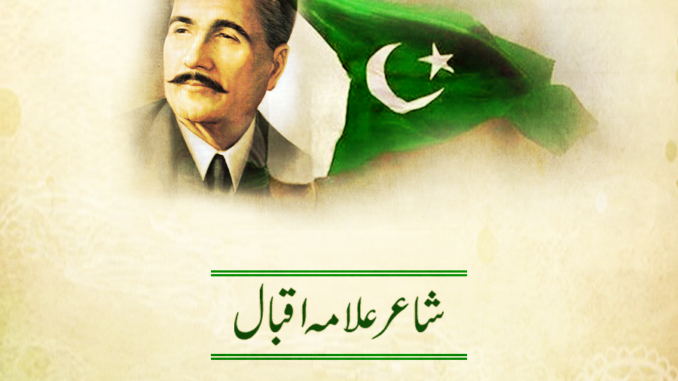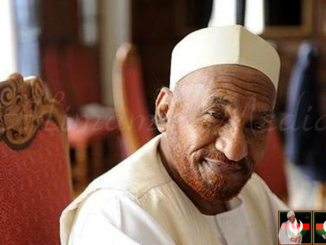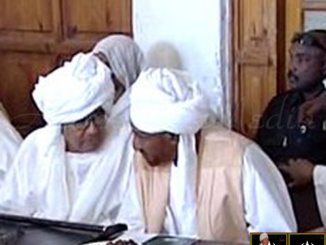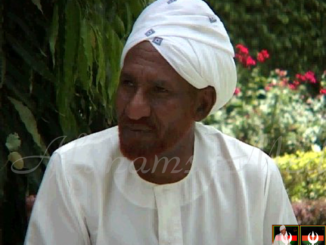
بسم الله الرحمن الرحيم
Two Day International Allama Iqbal Conference
Islamabad Club, Islamabad
7-8 November 2017
Organized by Muslim Institute
By: Al Sadig Al Mahdi
Contents
First Section: The Biographical Aspect:
Second Section: His legacy
Third Section: His Relevance
Dear brother chairman,
Fellow brothers and sisters of the conference,
Please accept my salutations, Salams and good wishes.
I highly appreciate the subject of this conference, and my invitation to contribute to its expected value added to our multi-faceted icon Al- Allama IQbal.
I shall address you about him under three titles, namely; a biographical aspect, his legacy and the relevance of his works to our contemporary Muslim and International affairs.
First Section: The Biographical Aspect:
During his life time, he manifested multiple talents, acquired multiple qualifications and engaged in numerous activities.
A mark of greatness is that after his death his achievements receive greater posthumous appreciation. As the Arabic poet put it:
Some people died,
But their virtues lived on,
Others are walking coffins
Another Arab poet, who visited his grave, Alsawi Shaalan:
I wonder at a star which shines in its absence,
Eclipsed, but most conspicuous
I never saw a vanishing star in accordance,
Whose light strikes eyes more and bedazzles
In our culture, we have rightly painted role models from the biographies of the companions of the Prophet PBUH. One weakness is that we trended to regard their history as sacred history; we must humanize that history to benefit from their example as human agents.
Moreover, the role modeling should not stop at a particular period of time, but continue to be pursued throughout the history of the Ummah.
The biography of Iqbal, and those in his league of achievement, should constitute for us a bibliography of desirable role models.
Second Section: His legacy
For Pakistan, he is a National poet, great thinker and a founding inspiration.
His aspiration for a new virtuous society, in my opinion, conceived of inspiring the Muslims of India to contribute to a reborn India, a type of updating of achievements of Mahmoud Ghaznawi, a purified Mogul Empire. However, political realities, after his death, led to partition and all the consequent tragedies.
His poetry was highly appreciated by Muslims in India and in the Muslim community worldwide.
In this respect, he is in league with Goethe for German culture, Shakespeare for English culture, Firdausi for Persian culture and so on.
His poetry may be described as Abul Allaa Al Maari, philosophy in verse. He regarded Al Rumi as his teacher, and so much of his poetry echoes Al- Rumi’s concept that all creatures worship the Creator and are entitled to perceive His presence, His light and His manifestations. Not Pantheism, but unity of perception of the Divine.
To properly understand Iqbal’s philosophy, it is necessary to define the image of Man:
Before Revelation, Man is endowed with attitudes which make him stand apart from all natural creatures: He received a Divine breath; he is endowed with Reason and free will.
Iqbal’s most revolutionary idea is that the prophet-hood of Muhammad PBUH as the final message, should free the believers to activate their natural endowments of Reason, spirituality and free will as sources of knowledge. However, traditional interpretations of the Sunnah of the Prophet PBUH have viewed it as constraint upon Reason and spiritual inspiration.
The end of Prophet-hood, for him, should constitute the birth of discursive intellect and spiritual inspiration for people.
Exercising such empowerment, Iqbal sought a very daring task under the title: Reconstruction of Religious Thought.
The whole Muslim World, by the 19th century, fell under Western domination. Although it was through superior military power that Western countries prevailed, the countries which they conquered were in dismal cultural and social decay. In the words of Malik Bin Nabi, it was a condition of colonizability (preparation for conquest).
The socio-cultural impact of the conquerors was stunning; consequently the conquered societies reacted in three scenarios: total rejection of the west, in contrast to total acceptance to the extent of absorption, the third reaction was to attempt at synthesis.
The third option was advocated by some Ulama, who were well versed in Islamic thought, but had a superficial understanding of western civilization, these are represented by Jamal Al Din Al Afghani, Mohammad Abdu, Rasheed Rida and others.
The secularists became politically and culturally dominant, which precipitated an Islamic fundamentalist reaction, which almost eclipsed the aspirations of the Afghani school. Rasheed Rida, its pupil, veered towards fundamentalism.
However, there were those who were well versed both in Islamic culture and western culture. To this school Iqbal belonged, along with such thinkers like Malik Bin Nabi, Ali Shariati and others. All three have made a serious effort at the reconstruction of Religious Thought. Their endeavor represents an Islamic Renaissance.
Iqbal was a devout believer in the faith of Islam but deplored traditionalists for making it a constraint upon Reason and freedom. He admired how Islam spread and dominated the world for seven centuries. He saw how the bloody aggressors of Genkiz Khan and Holaku were absorbed by Islam to become its preachers. He rejected the views of those who sacrificed identity in favor of development, arguing that if you ignore your identity you vanish. But as much as he argued for the sanctity of identity, he rejected the traditionalist views that make Islam irrelevant in the modern world.
The danger to Islam is not from Western civilization which itself is developed from roots in Islamic civilization as admitted by Bacon, Watt and others. The danger comes by failures within Islamic stagnant thought and social decay.
Herein, I outline Iqbal’s most important ideas:
A) The decent from Heaven is not a change of places, but a change in condition from a destined to a free life.
B) Fatalism destroys human endeavor, Ghadar depends upon our will.
C) We must eschew the culture of dependence upon the past to shape the future.
D) The Ulama and the governing tyrants have formed an unholy alliance to oppress the people. People must be liberated from this despotism.
E) The Muslim mind must be brave enough to choose its future without being captive to the sanctity of the past. The old Khilafa system has no revealed justification. The principle of justice which is so dear in Islam is best served by a democratic republican system. The history of the Khilafa is that of dynastic tyranny.
F) The development of Shariaa law is imperative. Islamic jurisprudence has certain targets; the regulations must develop continuously to serve these goals in the various changes of time and place.
He maintained that the revealed texts themselves request a dynamic attitude to legislation.
G) Worship is a broad manifestation of devotion it admits all those who seek to please God, to Him is the East and the west and whenever you turn God is there. Therefore he rejected the denunciation of Al Hallaj by the traditionists who called for his crossification. He said Louis Massignon was right about Al Hallaj. His position was not to see himself as separate from the eternal Divine. In this respect there is a Prophetic saying: God said: “My slave keeps on coming closer to Me through performing Nawafil till I love him. When I love him I become his hearing with which he hears, his seeing with which he sees, his hand with which he strikes, and his leg with which he walks; and if he asks (something) from Me, I give him, and if he asks My Protection (refuge), I protect him”. This idea Iqbal expressed poetically:
“If your greatness eclipsed you from the eye sight, the spiritual devotion closed the gap of self.”
H) He repeats with Al Rumi in support for honor of Man, and the fraternity of all the faiths. He maintains that the path to God transcends sects and dogmas. Iqbal put this in poetry:
“The universe is a Temple, all who do good are worshippers in it, those who do good cultivate the plant of the Truth, the doers of good in what they say and what they do in essence worship God and seek the Truth.”
Such ideas support the views of Ahmad Al Faruqi Al Sirhindi. This is distinct from the policy of Akhbar, the Sultan, who attempted to construct a new faith for India by a mechanical mixture of the different faiths.
I) Iqbal believed in the hereafter as an article of Islamic faith. He regarded its Quranic description as metaphorical. For him Paradise and Hell are conditions not places. Paradise is to end in God’s acceptance; Hell is to be subjected to purification of the evil doers so that they qualify for God’s acceptance. Although Quranic descriptions are specific, it is also stated that there is a new creation (خلق جديد) and that in Paradise are circumstances that no eye has seen, no ear has heard, and no perception conceived. All ends in God (إلى ربك المنتهى). For Iqbal, Paradise is a condition of vindication and satisfaction. There is no permanent damnation in Islam. Hell is not a pit dug by a vindictive deity, but a circumstance of purification for evil doers to qualify for a free life. Heaven is not to squat in idleness, but to enjoy spiritual happiness. He repeats with Rabiaa, the famous mystic in her poetic address to Allah:
“To worship You, to qualify for Your Paradise is a commercial deal, and to worship You in fear of Your Hell fire is the submission of slaves, it is those who worship You for who You are who know You”.
J) Iqbal argued for a view of fate (القدر) that rejects the traditional fateful determinism as a part of Islamic dogma. This view was invented by the tyrants to protect their despotic authority. Both Umayyad and Abbasid supporters argued in Muawia’s words: It is Allah who willed that we rule. If He did not approve of our governance, He would have changed it. Iqbal argued that people are free to determine their own fate. Fates are written after they take place. We will register what they present and their doings (وَنَكْتُبُ مَا قَدَّمُوا وَآثَارَهُمْ ), also we will register their verdicts and hold them accountable (سَتُكْتَبُ شَهَادَتُهُمْ وَيُسْأَلُونَ). The traditional view of fate as determinism is a shameful reduction of human worth. In his poetry:
“You Muslim who is a light from Heaven, who should rise in the world of Humanity. You are the author of your actions, not as the fools make of you as the captive of your fate”.
K) He rejected the belief in an expected Savior, Al Mahdi, as a belief which destroys will power. It makes believers surrender their duty to reform and entrust their fate to the expected Savior. It is interesting to me whose grandfather adopted a Mahdist belief to reflect upon Iqbal’s denunciation of Mahdism in Islam quoting Ibn Khuldun for support. Ibn Khuldun’s rejection of the idea is hollow, because he argued that it is subversive of government stability. However, the governments in question were despotic, and they claimed religious authority for their despotism. To destabilize them is something to be desired. But Iqbal’s argument for refutation of Mahdism as a belief in idle expectation and a deprivation of motive for change and reform is sound. My great grandfather did not describe his mission in any of the traditional beliefs of Mahdism. There is the belief of the Twelver Shias, who expect the twelfth Imam who disappeared twelve centuries ago to come back as the Mahdi. There is the belief of many Sunnah that the Mahdi will come at the end of Time. Both would qualify for Iqbal’s denunciation. However, my great grandfather believed in neither, his Mahdism claimed spiritual authority to express Mahdism in functional terms consistent with the need for change, namely:
· That prevalent Muslim opinion has constrained Islam with dogmas of human interpretation as expressed by different Sectarian schools. He argued that their schools are not binding. The only binding texts are the Quran and the Sunnah. It is revelation, not human findings, which is binding to Muslims.
· That in Islam there are matters which are permanent, namely, monotheism, Prophet-hood, the five pillars, and belief in the Hereafter. However, social and administrative matters are subject to continuous change. In his words: For different times and places and conditions there would be the qualified leaders (لكل وقت ومقام حال ولكل زمان وأوان رجال).
· He pointed out that the conditions of the contemporary Muslim world is dismal being divorced from the principles of Islam, subject to sharp Sectarian divisions, suffering numerous injustices, and being oppressed by foreign occupation. This called for a drastic movement to rid the world of Islam from injustices, disunity, and foreign domination. Many Muslim thinkers who did not believe in the traditional expressions of Mahdism, for example Ahmad Al Awam and even the authors of Al Urwah Al Wuthqa supported this functional role.
· He said that he looked up for someone who would lead Muslims to change that dismal condition, but there were none. In his reach for this dawn he received a spiritual contact by the Prophet PBUH as the Mahdi. This type of communication with the Prophet Muhammad PBUH is current in Sufi Islam.
· Therefore, he defined Mahdism in functional terms, rid Islam from shackles of the dogmas created by the past, received authority from a spiritual communication which is accepted currency amongst Sufis, but put a basic rider by a ruler that what he says or does should be measured by the texts of the Quran and Sunnah.
This form of functional Mahdism is supported by many Quranic verses, e.g. (If they reject (the Truth), we have commissioned others who will establish it) (إِن يَكْفُرْ بِهَا هَـؤُلاء فَقَدْ وَكَّلْنَا بِهَا قَوْماً لَّيْسُواْ بِهَا بِكَافِرِينَ).
I don’t think that Iqbal would cross swards with this functional expression of Mahdism.
L) Iqbal argues for Human responsibility:
“This is my world which I built with my knowledge and struggle, I have planned my destiny in this world. I have not been brought to this world by a vicious serpent or by a conniving woman, and I am not the victim of a permanent and tormenting Sin, I am in this world because I possess a plan for life and a will to build my world depending upon my own not external resources”.
M) Unfortunately, the seal of Prophet-hood has historically produced a world of static intellect, of frozen jurisprudence and of dynastic despotism. The Quran expects us to study the laws of the universe, to use our minds, to study the history of other people as a source of knowledge, all of which aspects are associated with the end of Prophet-hood. The end of Prophet-hood should compel us to create a world in which:
– Mind is empowered.
– Man recognized as honorable and equal.
– The message of the Prophet PBUH is internalized.
– Plurality of religious faiths is the acceptable norm.
– Sunnah is not a compulsion to repeat the past, but to use the method of the Prophet PBUH to deal with new experiences.
– However, although the end of Prophet-hood empowers the use of Reason, it does not end spiritual discourse. Yes there are no more Prophets, but there is Wilaya, i.e. spiritual elevation.
Herein lies a major dispute: Al Ghazali argued that perception is deceptive and so the mind is wanting. It is spiritual discourse which is the guide to the Truth. However, the most famous philosopher, Ibn Sina, said after three days of meeting with a famous Sufi –Abu Said Ibn Abu Al Khair: what I know, he “sees” and what he “sees” I know. This means that there are both rational and mystical paths to Truth. Iqbal belongs to this school.
N) Iqbal laments that traditionalists turned Sunnah into an iron jacket. The poem in which he calls the Prophet PBUH:
“Oh, you beacon of Truth, so many faults have been justified by sayings related to you. When you said what you said, you did not know that they will adopt them as a permanent constitution”.
Therefore, reconstruction of Religious Thought should not be conceived in terms of the traditional structures, but in terms of the social and natural laws of the universe.
Muslim thinkers before westerners have done that, Ibn Miskaweih has conceived of biological evolution, Ibn Rushd advocated rationalism, Ibn Khuldun perceived that all aspects of existence, natural or social, obey consistent laws. Such was the genius of Muslin minds liberated by the message of the Prophet PBUH.
O) The genius of Al Rumi was his emphasis on the phenomenon of teleology in the universe. History inevitably moves in a forward direction. This would lead to a higher new world.
P) Iqbal denounces spirituality which condones the status quo. There is an organic link between spiritual awareness and social justice, the call for liberating the oppressed people. In reference to the Islamic message he says:
“Haven’t you heard of the Faith which enlightened society, erased class distinctions, and restored that equality demanded by Human nature”.
Q) Iqbal advocated both rationalism and Sufism; he saw both as components of the attributes of Man. In this respect, his thinking made a constructive cross cultural awareness between Muslim and Western rationalists, and between Muslim and Western Sufis and mystics. In this respect he sees that nothing human is foreign to him. The heart of a human being is a source of enlightenment. The poem:
“Oh, you Human, you have a divine component in you, so take from your essence that spark and light, enlightenment is in yourself”. He says: “your heart is a sun, so take light from it, all what yourself expects is in you”. This Humanism was carried to greater length by Al-Rumi whom Iqbal considers his teacher. Rumi who is the master of the Sufi path in Islamic poetry has rejected monopoly of salvation, and refused to accept single ownership of Truth. He called for the fraternity of all faiths to honor and uphold Human brotherhood. Iqbal sees in this position the Muslim passport to the club of Human civilization. In this New World, there is no place for those who disbelieve in Humanity and reject Human brotherhood. All barricades should come down so that the faiths fraternize, ideologies coalesce, no generation supersedes another, no place for male superiority over female and no one is master and slave.
R) In a very beautiful poem, Iqbal expresses his concept of Islamic Humanism:
“All the world is a prayer place, all who do good in it worship, all who perfect their work, and all who give life to lifeless things, and who cultivate plants for others to feed, and provide water to quench thirst, and all those who build good constructions, and all those who advance human knowledge which benefits and not harm humans, and all who have come with good ideas and works, all such people are proper God worshippers, all have espoused the Goodness”.
S) Iqbal’s ideas, his views on the reconstruction of Religious Thought, and his role as a committed Muslim, who dared to defy traditional constructions, his being a conveyer belt between Rationalism and Sufism, between Islamic thought and Western thought, between Arab culture and Indian and Persian cultures; are all manifestations of his legacy.
I shall refer to the impact of his ideas of reconstruction in the third section of this paper, but at the end of this section I wish to point out some of his ideas, which I believe went astray:
· He referred to the philosophical ideas of Nietzsche in favorable terms. This philosopher was a very intelligent thinker who wasted his efforts at a crusade for atheism that went beyond the rational declaring the death of God. Far from his expectation, there was a rise in Religious fundamentalism in all faiths. His speculations inspired a type of dangerous secularist faith. A secular ideology which inspired supremacy and the consequent conflicts. It was the imagination of a sick mind, and should not have appealed to the constructive aspirations of Iqbal.
· He expressed admiration for Mustafa Kamal. This statesman was encouraged by his military successes and the decadence of Ottoman Turkey to adopt a form of irreligious secularism. His ideology and program has had a destructive effect by positing development against identity. His reforms have set up an opposite reaction in Turkey, and an extremist reaction in the opposite direction in the world of Islam. The application of military techniques in ideology and policies is bound to back fire.
· His sympathy for Marxism and Leninism may be understood in the context of the injustices of capitalism, and the oppressions of Czarist Russia. But for an intellectual like Iqbal, he should have seen the basic drawbacks of Marxism. The idea that materialism is the basis of all social intercourse, and that labor is the only factor of production; are basically wrong. Developments in Capitalism have through the democratic process driven Capitalism towards the welfare state and the development of countervailing forces in Capitalist Society. Leninism could be appreciated as a reaction to Russian feudal despotism. But it laid the seeds of Stalinism. I got the feeling that Iqbal was so disgusted with the prevalent status quo that he indiscriminately welcomed any radical change to replace it. This cannot be excused for a thinker in his statute.
Third Section: His Relevance
Here I shall discuss Iqbal’s relevance to the contemporary world of Islam and the International System:
1. Iqbal was so shocked by the disparity between a glorious past and a miserable present. He reflected in the imaginary words of Satan how much misery is in store for the Muslim world, and that its final destruction will come from inside. Many thinkers have attempted to seek reconciliation between Muslim sects, and to engineer synthesis between the world of Islam and Modern civilization. The world of Islam, more than ever, demands a Reconstruction of Religious Thought to engineer a synthesis between identity and modernization, and to overcome the divisive sectarian polarizations. In the International scene several factors like the Revolutions in information and in communication call for globalization, however, cultural diversity, economic interests and political ambitions have acted in a different direction.
2. There are several factors which preclude reformation. The following are the important factors:
A) The Kamalist Revolution in Turkey with its anti-Islamic programs went beyond replacement of the Ottomans to replacement of Islam. This encouraged a similar secularist assertion in many regions. An Islamicist reaction took many forms, so a sharp ideological polarization followed.
B) The Shah of Iran was a Kamalist Iranian version with a difference. The difference was that he became front man for Imperialist interests. Iran deeply committed to Shiism staged an anti-imperialist, Islamic Revolution, which ignited Shiaa aspirations all over the Muslim world.
C) Sunnah regions feared the spread of Revolution from Iran, and prepared to confront it. The polarization focused between Iran and Iraq, then between Iran and Saudi Arabia. The two countries have become champions of opposite sectarian positions.
D) Oil interests and the protection of Israel have increased the motives for intervention in the Region of the Middle East. That intervention has become the cause of AlQaeda in Afghanistan and Pakistan, and the emergence of Daesh in Iraq and Syria. They represent a new and more pernicious form of radicalism and terrorism.
E) So the region is now bisected by:
– Islamic, Secular conflicts.
– Sectarian conflicts.
– Extremist and Terrorist movements.
– Direct foreign intervention to shape the future of the Region.
In Iqbal’s characterization of the prophecy of Satan, the Region of the greater Middle East is more than ever divided and so immersed in actual or potential wars. The reconstruction of Religious Thought is more than ever necessary, but the current situation makes it more than ever impossible. It is in dark nights that the moon light becomes so necessary, in Arabic poem: وفي الليلة الظلماء يفقتد البدر. Therefore we should seriously engage in brushing up the thoughts of Iqbal and his league of reconstructors to outline a Roadmap for the inevitable rebirth.
I say inevitable because not only Muslims but the whole of Humanity would benefit.
I say that for nine reasons:
(1) The Quran is the only revealed Book whose text is authentic.
(2) Our faith is the only faith which recognizes Humans as such and honors them.
(3) It is unique in accepting the plurality of faiths, cultures, and national interests.
(4) It recognizes all the sources of knowledge: revelation, inspiration, rational and empirical.
(5) It ranks social justice with belief in God.
(6) It recognizes the authority of Mind in all natural phenomenon.
(7) Its Prophet is completely human and his biography subject to natural phenomenon.
(8) It defines a rational basis for morality.
(9) It takes a positive position vis-à-vis protection of the environment.
Such credentials make Islam consistent with all the evolution of Human Society, and if accepted it gives this new Human sphere of evolution moral and spiritual roots.
Synthesis between the Natural and supernatural worlds is imperative. Islam provides the answer.
Finally, May his soul rest in Peace. Although there could be reservations about some of his ideas, their spirit lives on, especially at a time when Sunni, Shii and secularist agendas have become the scourge of the Ummah, have nurtured extremism, have fueled terrorism and have provided avenues for hostile foreign intervention.
_______________________________________________________
* Note: the poems quoted here are translated from Arabic translations quoted by Dr. Mohammad Habash, a friend, who provided me with a copy of a yet to be published study he prepared on Iqbal.




